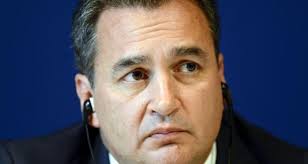By Andrew Warshaw
November 13 – If FIFA had hoped that today’s publication of the summary of Michael Garcia’s report into possible corruption surrounding the 2018 and 2022 World Cup bid process would bring some closure, the whole investigation was immediately plunged back into confusion and intrigue when Garcia himself incredibly claimed his evidence had been misrepresented and that he was not happy with the findings.
Within just three hours of Russia and Qatar being cleared to hang on to the 2018 and 2022 World Cups respectively by FIFA ethics judge Hans-Joachim Eckert, based on Garcia’s report, the former US attorney’s office pounced on Eckert’s summation and rushed out a statement suggesting part of the wording did not accurately reflect the evidence he had submitted in his 430-page file that followed a two-year probe involving dozens of witnesses.
“Today’s decision by the Chairman of the Adjudicatory Chamber contains numerous materially incomplete and erroneous representations of the facts and conclusions detailed in the Investigatory Chamber’s report,” said the statement.
“I intend to appeal this decision to the FIFA Appeal Committee.”
Garcia’s claims that Eckert had released misleading conclusions about who did what to whom opens up a new can of worms, especially since Insideworldfootball understands Garcia signed off Eckert’s verdicts before they were made public on FIFA’s website for general consumption.
In his brief statement, Garcia effectively accuses his ethics committee colleague of getting his facts wrong, an accusation that further fuelled a social media frenzy over a cover-up.
Garcia, like many influential officials but unlike Eckert, was in favour of full publication of his report even though that would have compromised confidentiality pledges made to the witnesses who were interviewed. It is understood that Garcia and Eckert left on uneasy terms following this disagreement at the FIFA Ethics conference in Zurich last month
One thing is for sure. Garcia appealing his own body’s interpretation of his account will prove counter-productive in terms of building confidence in the independence of FIFA’s ethics process – whichever of the political conspiracy sides you sit on.
If Garcia loses his appeal, he could go to the Court of Arbitration for Sport – the very body where some of the individual FIFA powerbrokers banned by him have taken their cases.
Meanwhile, Jerome Champagne, the first officially declared candidate to take on Sepp Blatter for the FIFA presidency next year, believes Eckert’s findings only increase the need for further reforms.
Eckert proposed a maximum of two four-year terms for all members of FIFA’s executive committee, one of the few reform proposals rejected by Blatter, odds-on favourite to clinch a fifth term in May, and thrown out at this year’s FIFA Congress.
“I have said constantly and consistently that the FIFA World Cup should be protected for what it represents for the game and for the football community at large, and that as a consequence, we needed and still need to know what happened before and after the December 2010 vote,” said Champagne in a statement.
“Giving back the power to decide the host of the FIFA World Cup to the 209 national associations who are the real members of FIFA was a very important decision which was adopted and that I fully supported. But more reforms are now needed.”
Contact the writer of this story at moc.l1751417720labto1751417720ofdlr1751417720owedi1751417720sni@w1751417720ahsra1751417720w.wer1751417720dna1751417720

